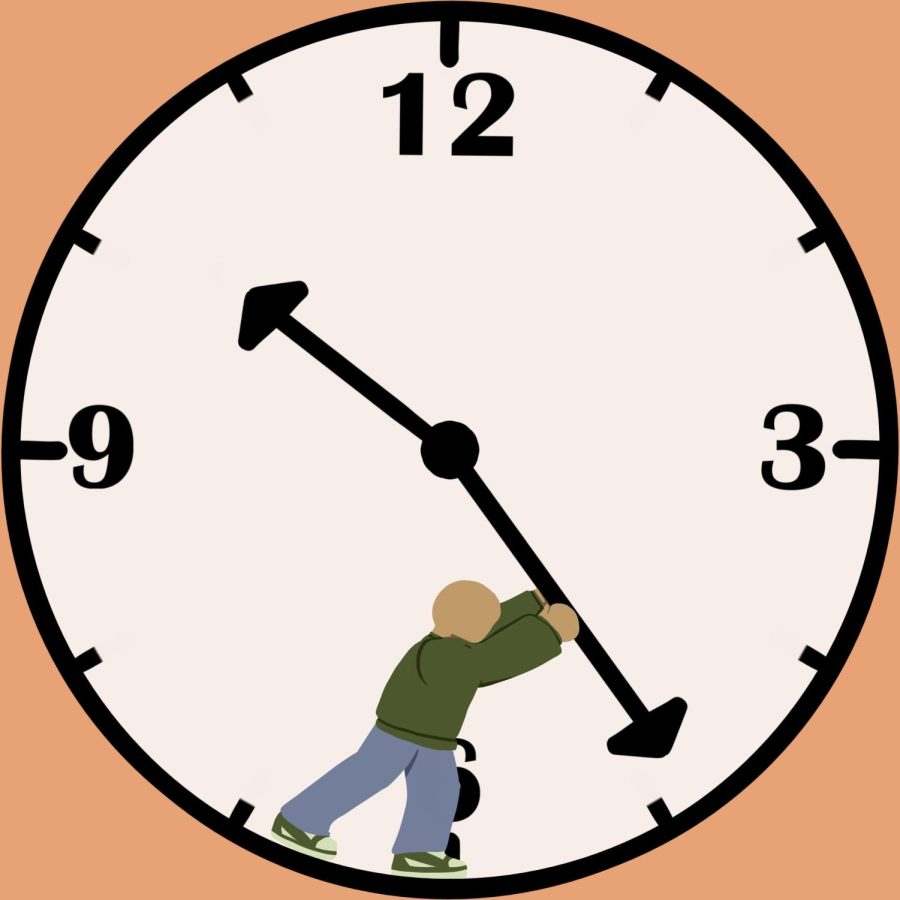Opinion | Time is not of the essence — don’t use it to measure the things that matter
February 15, 2023
Time marches forward and stops for no one — a tragic fact to accept for procrastinators everywhere — but its continual movement makes it our most versatile measurement. How far away is the store? 15 minutes. How well can they play the guitar? They’ve been playing for five years. How do I know when this chicken is done? After 25 minutes.
Time rules our lives, and there is rarely a moment during the day when we don’t know what time it is. Its consistency is infinitely useful for scheduling because time moves the same for everyone. Twenty minutes in traffic is the same for you as it is for the guy honking at you.
However, the regularity of time comes with a great drawback — it can’t adequately measure our human experiences. The clock ticks every second, and it will tick at a constant pace until the end of eternity … or until it runs out of battery.
Our lives do not develop at a constant rate. The human experience is incredibly inconsistent, confusing and frustrating, and because of this, time doesn’t really tell us all that much.
I gave the example of an individual who played guitar for five years, and most would expect that five years of practice would indicate a fairly skilled guitar player. Now, I have played guitar for five years, and, unfortunately, I kind of suck at it.
Even relationship anniversaries can seem somewhat arbitrary if we set aside our collective fetish for time. Every romantic gesture, emotional breakthrough and shared life experience all get kicked to the curb in favor of a celebration of not separating for 365 days.
In some instances, relying too heavily on time as a measure for your life can become harmful. It places a linear expectation of progress on nonlinear personal development.
After a tragedy, a lot of people fall back on the old idiom, “time heals all wounds.” It’s comforting to know that no matter what happens, everything will be better at some point in the future, but this can often lead to unhealthy expectations for recovery.
Progress goals ruled by time lead people to fall into thought processes like, “it’s been six months. Why am I not better?” We delude ourselves into believing that there are clear standards for improvement after a given period of time. In reality, these standards are nearly impossible to meet simply due to the unpredictability of human beings.
It is very possible that you could end up worse off six months after a significant change in your life, and that is okay. Everyone’s walk of life is different, and more importantly, our development is wildly sporadic.
Many find it difficult to self-reflect. There is no universal measure to evaluate yourself as a person. We cling to time for comfort and consistency.
Maybe you can’t say for sure if you’re a better person than you were a year ago. Or you don’t know if you love your partner more or less than you did a year ago. Or you aren’t sure if you have a clearer direction for your life than you had a year ago. All you know for certain is that it’s been a year.
But what if you didn’t focus on that? There are infinite ways to measure your life — take it from “Rent” — all of which are just as irregular and strange as your experiences. Measure it in friends, books, instruments, hairstyles, love — anything but time. Because what the hell does time tell you about anything?
We always seem to think we’re running out of time, and this is true to some extent. You lose a second of your life every second, but luckily, you’ve got nearly two and a half billion of them to burn through if you plan to die of old age. Our time on Earth is finite, but that doesn’t mean we don’t have a lot of it.
So use it how you want. Set personal goals for yourself, but don’t tie them to some arbitrary date. Take the steps necessary to become who you want to be, and you’ll get there eventually. If you really want to commit to it, lose track of your birthday, and when someone asks how old you are, shrug and say you aren’t quite sure.
Time is omnipresent and always moving. Use it to plan your trip to the store or manage your assignments, but never try to measure your personal worth with it.
Thomas Riley primarily writes social satire and stories about politics and philosophy. Write to them at [email protected]









